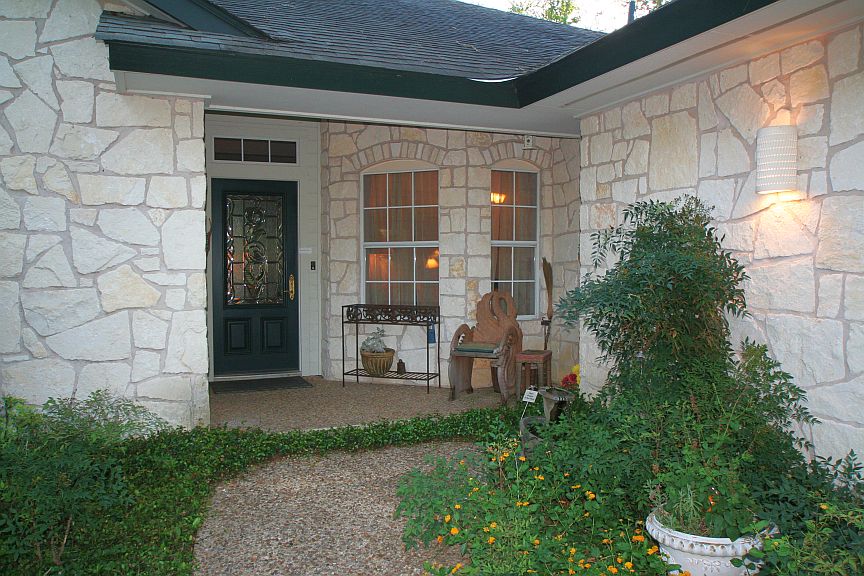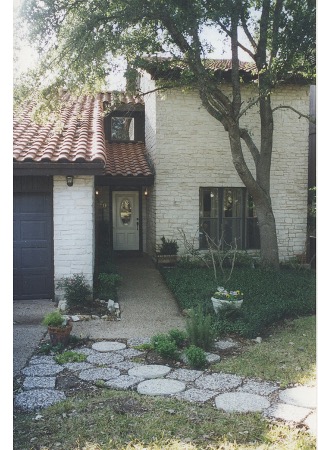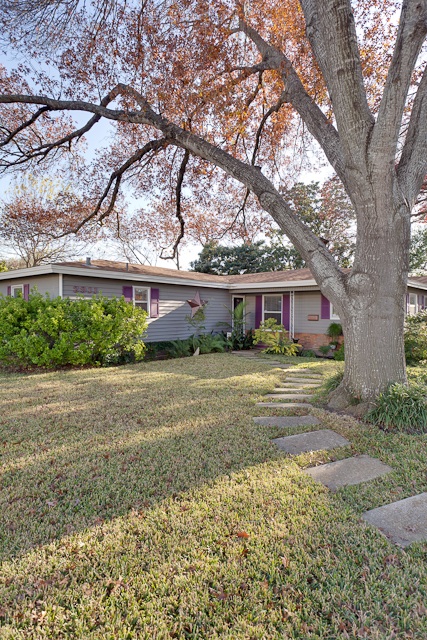by Nancy Wesson
Reprinted from The Austin Homesteader, 2003
Have you ever noticed your reaction to houses with curved or winding pathways leading to the front door is different from those with straight-on sidewalks or none at all? Never really thought about it? Well – maybe not, but I’ll just bet it influences you in subliminal ways that may not have percolated up to consciousness.

To be honest, when I first began studying Feng Shui and heard that the path to the front door influences the life of its occupants, I thought that was a little nuts. So bear with me if you’re having a similar reaction. Think of houses that “call” to you or give you that “coming home” feeling – even if your childhood home didn’t look anything like that.
The Language of Sidewalks
It seems that high-end homes nearly always have luxurious, meandering pathways through the landscaping and trees, allowing you time to slow down and smell the flowers before being graciously delivered to the front door. Somehow you just “know” that behind that front door you’ll be greeted with open arms, the smell of freshly baked goodies and a well loved family dog.
Because the sidewalk has a language all its own, it creates a specific psychological mindset without your knowing one other thing about the home or its inhabitants. In Feng Shui vernacular it has to do with the way energy travels and meanders. Straight lines rarely occur in nature and when they do the feeling is more one of hurrying along, efficiency, and a “get to the point” frame of mind. There’s nothing invitational about it.
In the world of sailing, there’s a term for the “distance wind blows unobstructed over water – contributing the buildup of waves” and mind bending wind. The term is “fetch.”

Having done a lot of offshore and heavy weather sailing in my more foolhardy years, I became all to well acquainted with the realities of this concept of “fetch, “ and it has served me well in my work with Feng Shui. Given the same distance of travel, a gentle breeze of 3 knots just off shore – where trees and buildings have slowed its movement – can build to 60 knots by the time it hits the sails of a boat 50 miles at sea. Since wind is energy, this is a helpful metaphor for thinking about the way energy impacts the entrance of a house.
When speaking of houses, this translates to how the world impacts the residents inside as well as their connection to the community outside the front door.
Connections
Here’s the way it works. Your pathway or sidewalk represents both a literal and symbolic connection to your neighbor hood and to the world at large. It signals either that friends and opportunity are welcome or says, “don’t even think about stopping here.” OK – so you don’t want traveling sales people to come to your front door! Trust me, the brazen will find you no matter what.
Many new homes these days have sort, right-angle sidewalks that take you from the driveway to the front door, avoiding any connection whatsoever with the rest of the neighbor hood or the street. The unspoken psychological message here is: “If you know me well enough to drive into my driveway, then you can come to the front door.” To others, it says, “stay away.” When you think of opportunity as a guest that is going to have a hard time knocking at that front door, it places everything in a new light.
I heard that! You said “NO WAY I’m gonna dig up my sidewalk!” Nor do you have to. There are other, inexpensive but effective ways to transform or create a path. Here are some thoughts.
Creating a New Look
First, you MUST have a path connecting the front door to the street. Doesn’t matter if you don’t use it. This is operating on deep symbolic levels and as such it’s very powerful. So, lay some stepping-stones in a meandering path to the street.

Use any material you like, placing the stones close enough together to get the sense of a “path.” You might dig out a little nest for them so you can mow over them. To give a feeling of continuity with the rest of the house or existing sidewalk, check out your local hardware or landscaping store. Landscaping stones will be more expensive, rock aggregate and cement are cheapest. I
f you’re lucky enough to live in an area where you can gather flattish limestone or slate, that’s actually the cheapest.
Take a look at the image on the right for an inexpensive approach and then design your own.

In the image to the left, there are multiple entries to the house, but this gently curving sidewalk starts at the curb, and guides the visitor to the front door. The stones are concrete and flush with the lawn, and mowing over them is easy.
More guidelines:
1. Keep stepping stones as level as possible. You don’t want opportunity or friends falling down on the way to the front door.
2. Create the illusion of a curve in a straight sidewalk, by adding landscaping or lighting.
3. Right-angle sidewalks can be extended to the street by coming off one side or edge with stepping stones leading to the street.
4. In Hong Kong, straight walkways are made to appear curved with curvilinear
patterns in the brickwork or strategically placed statuary.
Change Your Life
You’ll be amazed at the changes that begin when you do this. I lived in a cozy little neighbor hood for a year before I tackled the sidewalk project. During that year, I’d been out working in my yard, as folks would walk by on the street, not a soul spoke. The day I finished the sidewalk extension (done with stepping stones and pea gravel) all sorts of people began stopping to chat, business opportunities flowed in, and I truly felt more connected to the world. What’s more, similar sidewalk “renovations” popped up all over the neighborhood!
So get a shovel and some stones and get to work changing your life. My clients have told me some great stories about how it’s eased tensions with neighbors, improved their careers (remember a center front door is in the career zone), and brought helpers into their lives. I’d love to hear your story or questions.
